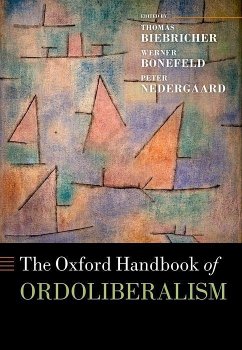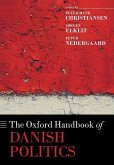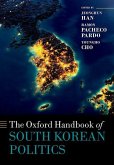The Oxford Handbook of Ordoliberalism
Herausgeber: Biebricher, Thomas; Nedergaard, Peter; Bonefeld, Werner
The Oxford Handbook of Ordoliberalism
Herausgeber: Biebricher, Thomas; Nedergaard, Peter; Bonefeld, Werner
- Gebundenes Buch
- Merkliste
- Auf die Merkliste
- Bewerten Bewerten
- Teilen
- Produkt teilen
- Produkterinnerung
- Produkterinnerung
This Handbook provides a comprehensive study of ordoliberalism from the intellectual origins and prime exemplars to its main theoretical themes and practical applications up to the most recent debates taking place across a range of disciplines.
Andere Kunden interessierten sich auch für
![The Oxford Handbook of Danish Politics The Oxford Handbook of Danish Politics]() The Oxford Handbook of Danish Politics210,99 €
The Oxford Handbook of Danish Politics210,99 €![The Oxford Handbook of U.S. Women's Social Movement Activism The Oxford Handbook of U.S. Women's Social Movement Activism]() The Oxford Handbook of U.S. Women's Social Movement Activism202,99 €
The Oxford Handbook of U.S. Women's Social Movement Activism202,99 €![The Oxford Handbook of History and International Relations The Oxford Handbook of History and International Relations]() The Oxford Handbook of History and International Relations202,99 €
The Oxford Handbook of History and International Relations202,99 €![Oxford Handbook of the History of Terrorism Oxford Handbook of the History of Terrorism]() Carola DietzeOxford Handbook of the History of Terrorism236,99 €
Carola DietzeOxford Handbook of the History of Terrorism236,99 €![The Oxford Handbook of Politics and Performance The Oxford Handbook of Politics and Performance]() The Oxford Handbook of Politics and Performance236,99 €
The Oxford Handbook of Politics and Performance236,99 €![The Oxford Handbook of Historical Political Economy The Oxford Handbook of Historical Political Economy]() The Oxford Handbook of Historical Political Economy219,99 €
The Oxford Handbook of Historical Political Economy219,99 €![The Oxford Handbook of South Korean Politics The Oxford Handbook of South Korean Politics]() The Oxford Handbook of South Korean Politics215,99 €
The Oxford Handbook of South Korean Politics215,99 €-
-
-
This Handbook provides a comprehensive study of ordoliberalism from the intellectual origins and prime exemplars to its main theoretical themes and practical applications up to the most recent debates taking place across a range of disciplines.
Hinweis: Dieser Artikel kann nur an eine deutsche Lieferadresse ausgeliefert werden.
Hinweis: Dieser Artikel kann nur an eine deutsche Lieferadresse ausgeliefert werden.
Produktdetails
- Produktdetails
- Verlag: Hurst & Co.
- Seitenzahl: 592
- Erscheinungstermin: 29. Dezember 2022
- Englisch
- Abmessung: 250mm x 175mm x 39mm
- Gewicht: 1146g
- ISBN-13: 9780198861201
- ISBN-10: 0198861206
- Artikelnr.: 66121954
- Herstellerkennzeichnung
- Libri GmbH
- Europaallee 1
- 36244 Bad Hersfeld
- gpsr@libri.de
- Verlag: Hurst & Co.
- Seitenzahl: 592
- Erscheinungstermin: 29. Dezember 2022
- Englisch
- Abmessung: 250mm x 175mm x 39mm
- Gewicht: 1146g
- ISBN-13: 9780198861201
- ISBN-10: 0198861206
- Artikelnr.: 66121954
- Herstellerkennzeichnung
- Libri GmbH
- Europaallee 1
- 36244 Bad Hersfeld
- gpsr@libri.de
Thomas Biebricher received his doctorate in Political Science from the University of Freiburg in 2003. From 2003 to 2009 he was a Visiting Assistant Professor at the Department of Political Science of the University of Florida in Gainesville. From 2009 to 2012 he was Junior Research Group Director at the Cluster of Excellence 'Normative Orders' at the Goethe University in Frankfurt where he continued to hold various other positions until 2020. In 2014 he spent some months on a research stay at the Institute of European Studies at the University of British Columbia in Vancouver. Since July 2020 he is Associate Professor for the History of Economic Governance at the Department of Management, Politics, and Philosophy at Copenhagen Business School. Werner Bonefeld is Professor in Politics at the University of York. Before coming to York, he taught at the Universities of Frankfurt and Edinburgh. His research is in the area of political economy as a critical social theory. His work has contributed to the development of Open Marxism, which integrates early Frankfurt School critical theory and the critique of political economy. He has published about the restructuring of the British State, the global economy, European integration, antisemitism, critical theory and Marx. With Chris O'Kane he is co-editor of the Bloomsbury Series Critical Theory and the Critique of Society. Peter Nedergaard is professor of Political Science at the University of Copenhagen since 2008. Before that, he was Professor, Associate Professor, and Assistant Professor at Copenhagen Business School. He holds a Ph.D. in Political Science from University of Aarhus. His research interests are European politics and the political economy of European integration, Nordic cooperation, and international political economy. In relation to this he has analyzed the common agricultural policy, the market integration, Nordic cooperation, employment policy, international trade policy, as well as the administration of EU and Nordic cooperation. He has published extensively in these areas.
* Introduction
* 1: Thomas Biebricher, Werner Bonefeld, and Peter Nedergaard: Why a
book on Ordoliberalism?
* Part I. Contexts
* 2: Bertram Schefold: Theoretical context: Ordoliberalism as a new
synthesis of earlier German economic thought
* 3: Ralf Ptak: Historical context of the theoretical formation: Weimar
democracy, Weltwirtschaftskrise and the rise of National Socialism
* 4: William Callison: Historical Context of Ordoliberalism's
Theoretical Development
* 5: Philip Mirowski: Ordoliberalism within the Historical Trajectory
of Neoliberalism
* 6: Thomas Biebricher: Ordoliberalism and Conservatism
* Part II. Key thinkers and key texts
* 7: Manuel Wörsdörfer: Walter Eucken: Foundations of Economics
* 8: Michelle Everson: Franz Böhm: Private Law Society and Lessons for
our Age
* 9: Raphaël Fèvre: Wilhelm Röpke: The Social Crisis of Our Time
* 10: Stefan Kolev and Nils Goldschmidt: Alexander Rüstow: The Failure
of Economic Liberalism
* 11: Ralf Ptak: Alfred Müller-Armack: The "State Idea" and the
Economic Order - Metamorphoses from 1932 to 1978
* 12: Ralf Ptak: Leonhard Miksch: "Competition as a Task" in Science,
Journalism and Politics
* 13: Christian Joerges: Ernst-Joachim Mestmäcker: A vision of European
Economic Constitutionalism
* 14: Malte Dold: Viktor Vanberg: The Constitution of Markets and
Public Choice
* 15: Viktor J. Vanberg: Adam Smith: Classical Political Economy and
Ordoliberalism
* 16: Alec Dinnin: Ortega y Gasset: The fear of mass society
* 17: Renato Cristi: Carl Schmitt: Decisionism
* Part III. Political economy
* 18: Klaus Tuori: Economic Constitution and the State
* 19: Dieter Plehwe: The Economic State and the Ordoliberal Critique of
Keynesianism: Anti-economic state or just a different type of
economic state?
* 20: Jonathan White: Rule of Law (Rechtsstaat) and Social Order
* 21: Ralf Havertz: The Strong State and "the Taming of Freedom"
* 22: Hagen Schulz-Forberg: Balancing the World: (De-)centralisation,
regionalism, and international organisation in the world economy
* 23: Josef Hien: The Social Market Economy and Ordoliberalism - a
difficult relationship
* Part IV. Politics
* 24: Joshua Rahtz: The Politics of Order and Law: Ordnungspolitik
* 25: Rune Møller Stahl: Politics and the Order of Society
* 26: Astrid Séville and Sebastian Pieper: Politics of Decision-Making:
Government by Experts and the Politics of Depoliticisation
* 27: Philip Manow: Myth, Religion, and Social Market Economy
* Part V. Policies
* 28: Angela Wigger: Competition Laws and Their Enforcement in
theProject of European Integration. An Artefact of Ordoliberal
Influence?
* 29: Ekkehard A. Köhler: Ordoliberal Economic Policy
* 30: Harald Hagemann: Economic Crisis Policy
* 31: Harald Hagemann: Labour Market Policy
* 32: Jörg Bibow: Walter Eucken on Currency Matters and Central Banking
* 33: Stefan Kolev and Nils Goldschmidt: Vitalpolitik
* 34: Lars Cornelissen: Post-War Ordoliberalism, Race, and the Politics
of Development
* Part VI. Contemporary issues
* 35: Quinn Slobodian: Ordoliberals on Federalism and Europe
* 36: Federico Bruno: Eurozone Policy and Crisis
* 37: Remi Maier-Rigaud: Social Policy in an Entrepreneurial Society
* 38: Frieder Vogelmann: Ordoliberalism as Political Rationality in
Foucault's Genealogy of Liberalism
* 1: Thomas Biebricher, Werner Bonefeld, and Peter Nedergaard: Why a
book on Ordoliberalism?
* Part I. Contexts
* 2: Bertram Schefold: Theoretical context: Ordoliberalism as a new
synthesis of earlier German economic thought
* 3: Ralf Ptak: Historical context of the theoretical formation: Weimar
democracy, Weltwirtschaftskrise and the rise of National Socialism
* 4: William Callison: Historical Context of Ordoliberalism's
Theoretical Development
* 5: Philip Mirowski: Ordoliberalism within the Historical Trajectory
of Neoliberalism
* 6: Thomas Biebricher: Ordoliberalism and Conservatism
* Part II. Key thinkers and key texts
* 7: Manuel Wörsdörfer: Walter Eucken: Foundations of Economics
* 8: Michelle Everson: Franz Böhm: Private Law Society and Lessons for
our Age
* 9: Raphaël Fèvre: Wilhelm Röpke: The Social Crisis of Our Time
* 10: Stefan Kolev and Nils Goldschmidt: Alexander Rüstow: The Failure
of Economic Liberalism
* 11: Ralf Ptak: Alfred Müller-Armack: The "State Idea" and the
Economic Order - Metamorphoses from 1932 to 1978
* 12: Ralf Ptak: Leonhard Miksch: "Competition as a Task" in Science,
Journalism and Politics
* 13: Christian Joerges: Ernst-Joachim Mestmäcker: A vision of European
Economic Constitutionalism
* 14: Malte Dold: Viktor Vanberg: The Constitution of Markets and
Public Choice
* 15: Viktor J. Vanberg: Adam Smith: Classical Political Economy and
Ordoliberalism
* 16: Alec Dinnin: Ortega y Gasset: The fear of mass society
* 17: Renato Cristi: Carl Schmitt: Decisionism
* Part III. Political economy
* 18: Klaus Tuori: Economic Constitution and the State
* 19: Dieter Plehwe: The Economic State and the Ordoliberal Critique of
Keynesianism: Anti-economic state or just a different type of
economic state?
* 20: Jonathan White: Rule of Law (Rechtsstaat) and Social Order
* 21: Ralf Havertz: The Strong State and "the Taming of Freedom"
* 22: Hagen Schulz-Forberg: Balancing the World: (De-)centralisation,
regionalism, and international organisation in the world economy
* 23: Josef Hien: The Social Market Economy and Ordoliberalism - a
difficult relationship
* Part IV. Politics
* 24: Joshua Rahtz: The Politics of Order and Law: Ordnungspolitik
* 25: Rune Møller Stahl: Politics and the Order of Society
* 26: Astrid Séville and Sebastian Pieper: Politics of Decision-Making:
Government by Experts and the Politics of Depoliticisation
* 27: Philip Manow: Myth, Religion, and Social Market Economy
* Part V. Policies
* 28: Angela Wigger: Competition Laws and Their Enforcement in
theProject of European Integration. An Artefact of Ordoliberal
Influence?
* 29: Ekkehard A. Köhler: Ordoliberal Economic Policy
* 30: Harald Hagemann: Economic Crisis Policy
* 31: Harald Hagemann: Labour Market Policy
* 32: Jörg Bibow: Walter Eucken on Currency Matters and Central Banking
* 33: Stefan Kolev and Nils Goldschmidt: Vitalpolitik
* 34: Lars Cornelissen: Post-War Ordoliberalism, Race, and the Politics
of Development
* Part VI. Contemporary issues
* 35: Quinn Slobodian: Ordoliberals on Federalism and Europe
* 36: Federico Bruno: Eurozone Policy and Crisis
* 37: Remi Maier-Rigaud: Social Policy in an Entrepreneurial Society
* 38: Frieder Vogelmann: Ordoliberalism as Political Rationality in
Foucault's Genealogy of Liberalism
* Introduction
* 1: Thomas Biebricher, Werner Bonefeld, and Peter Nedergaard: Why a
book on Ordoliberalism?
* Part I. Contexts
* 2: Bertram Schefold: Theoretical context: Ordoliberalism as a new
synthesis of earlier German economic thought
* 3: Ralf Ptak: Historical context of the theoretical formation: Weimar
democracy, Weltwirtschaftskrise and the rise of National Socialism
* 4: William Callison: Historical Context of Ordoliberalism's
Theoretical Development
* 5: Philip Mirowski: Ordoliberalism within the Historical Trajectory
of Neoliberalism
* 6: Thomas Biebricher: Ordoliberalism and Conservatism
* Part II. Key thinkers and key texts
* 7: Manuel Wörsdörfer: Walter Eucken: Foundations of Economics
* 8: Michelle Everson: Franz Böhm: Private Law Society and Lessons for
our Age
* 9: Raphaël Fèvre: Wilhelm Röpke: The Social Crisis of Our Time
* 10: Stefan Kolev and Nils Goldschmidt: Alexander Rüstow: The Failure
of Economic Liberalism
* 11: Ralf Ptak: Alfred Müller-Armack: The "State Idea" and the
Economic Order - Metamorphoses from 1932 to 1978
* 12: Ralf Ptak: Leonhard Miksch: "Competition as a Task" in Science,
Journalism and Politics
* 13: Christian Joerges: Ernst-Joachim Mestmäcker: A vision of European
Economic Constitutionalism
* 14: Malte Dold: Viktor Vanberg: The Constitution of Markets and
Public Choice
* 15: Viktor J. Vanberg: Adam Smith: Classical Political Economy and
Ordoliberalism
* 16: Alec Dinnin: Ortega y Gasset: The fear of mass society
* 17: Renato Cristi: Carl Schmitt: Decisionism
* Part III. Political economy
* 18: Klaus Tuori: Economic Constitution and the State
* 19: Dieter Plehwe: The Economic State and the Ordoliberal Critique of
Keynesianism: Anti-economic state or just a different type of
economic state?
* 20: Jonathan White: Rule of Law (Rechtsstaat) and Social Order
* 21: Ralf Havertz: The Strong State and "the Taming of Freedom"
* 22: Hagen Schulz-Forberg: Balancing the World: (De-)centralisation,
regionalism, and international organisation in the world economy
* 23: Josef Hien: The Social Market Economy and Ordoliberalism - a
difficult relationship
* Part IV. Politics
* 24: Joshua Rahtz: The Politics of Order and Law: Ordnungspolitik
* 25: Rune Møller Stahl: Politics and the Order of Society
* 26: Astrid Séville and Sebastian Pieper: Politics of Decision-Making:
Government by Experts and the Politics of Depoliticisation
* 27: Philip Manow: Myth, Religion, and Social Market Economy
* Part V. Policies
* 28: Angela Wigger: Competition Laws and Their Enforcement in
theProject of European Integration. An Artefact of Ordoliberal
Influence?
* 29: Ekkehard A. Köhler: Ordoliberal Economic Policy
* 30: Harald Hagemann: Economic Crisis Policy
* 31: Harald Hagemann: Labour Market Policy
* 32: Jörg Bibow: Walter Eucken on Currency Matters and Central Banking
* 33: Stefan Kolev and Nils Goldschmidt: Vitalpolitik
* 34: Lars Cornelissen: Post-War Ordoliberalism, Race, and the Politics
of Development
* Part VI. Contemporary issues
* 35: Quinn Slobodian: Ordoliberals on Federalism and Europe
* 36: Federico Bruno: Eurozone Policy and Crisis
* 37: Remi Maier-Rigaud: Social Policy in an Entrepreneurial Society
* 38: Frieder Vogelmann: Ordoliberalism as Political Rationality in
Foucault's Genealogy of Liberalism
* 1: Thomas Biebricher, Werner Bonefeld, and Peter Nedergaard: Why a
book on Ordoliberalism?
* Part I. Contexts
* 2: Bertram Schefold: Theoretical context: Ordoliberalism as a new
synthesis of earlier German economic thought
* 3: Ralf Ptak: Historical context of the theoretical formation: Weimar
democracy, Weltwirtschaftskrise and the rise of National Socialism
* 4: William Callison: Historical Context of Ordoliberalism's
Theoretical Development
* 5: Philip Mirowski: Ordoliberalism within the Historical Trajectory
of Neoliberalism
* 6: Thomas Biebricher: Ordoliberalism and Conservatism
* Part II. Key thinkers and key texts
* 7: Manuel Wörsdörfer: Walter Eucken: Foundations of Economics
* 8: Michelle Everson: Franz Böhm: Private Law Society and Lessons for
our Age
* 9: Raphaël Fèvre: Wilhelm Röpke: The Social Crisis of Our Time
* 10: Stefan Kolev and Nils Goldschmidt: Alexander Rüstow: The Failure
of Economic Liberalism
* 11: Ralf Ptak: Alfred Müller-Armack: The "State Idea" and the
Economic Order - Metamorphoses from 1932 to 1978
* 12: Ralf Ptak: Leonhard Miksch: "Competition as a Task" in Science,
Journalism and Politics
* 13: Christian Joerges: Ernst-Joachim Mestmäcker: A vision of European
Economic Constitutionalism
* 14: Malte Dold: Viktor Vanberg: The Constitution of Markets and
Public Choice
* 15: Viktor J. Vanberg: Adam Smith: Classical Political Economy and
Ordoliberalism
* 16: Alec Dinnin: Ortega y Gasset: The fear of mass society
* 17: Renato Cristi: Carl Schmitt: Decisionism
* Part III. Political economy
* 18: Klaus Tuori: Economic Constitution and the State
* 19: Dieter Plehwe: The Economic State and the Ordoliberal Critique of
Keynesianism: Anti-economic state or just a different type of
economic state?
* 20: Jonathan White: Rule of Law (Rechtsstaat) and Social Order
* 21: Ralf Havertz: The Strong State and "the Taming of Freedom"
* 22: Hagen Schulz-Forberg: Balancing the World: (De-)centralisation,
regionalism, and international organisation in the world economy
* 23: Josef Hien: The Social Market Economy and Ordoliberalism - a
difficult relationship
* Part IV. Politics
* 24: Joshua Rahtz: The Politics of Order and Law: Ordnungspolitik
* 25: Rune Møller Stahl: Politics and the Order of Society
* 26: Astrid Séville and Sebastian Pieper: Politics of Decision-Making:
Government by Experts and the Politics of Depoliticisation
* 27: Philip Manow: Myth, Religion, and Social Market Economy
* Part V. Policies
* 28: Angela Wigger: Competition Laws and Their Enforcement in
theProject of European Integration. An Artefact of Ordoliberal
Influence?
* 29: Ekkehard A. Köhler: Ordoliberal Economic Policy
* 30: Harald Hagemann: Economic Crisis Policy
* 31: Harald Hagemann: Labour Market Policy
* 32: Jörg Bibow: Walter Eucken on Currency Matters and Central Banking
* 33: Stefan Kolev and Nils Goldschmidt: Vitalpolitik
* 34: Lars Cornelissen: Post-War Ordoliberalism, Race, and the Politics
of Development
* Part VI. Contemporary issues
* 35: Quinn Slobodian: Ordoliberals on Federalism and Europe
* 36: Federico Bruno: Eurozone Policy and Crisis
* 37: Remi Maier-Rigaud: Social Policy in an Entrepreneurial Society
* 38: Frieder Vogelmann: Ordoliberalism as Political Rationality in
Foucault's Genealogy of Liberalism








